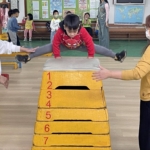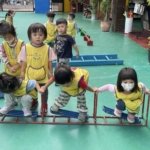A look at 2 reasons why German children are so good at expressing themselves.
Unlike in Taiwan, children's ability to express themselves has always been a key learning goal in German kindergartens. If children are not encouraged to express their opinions in the learning environment, and are only allowed to practice expression in weekly speech lessons, or are only trained to express themselves in unnatural gestures and cadences when participating in speech or recitation competitions, it is naturally difficult for them to improve their speaking skills. The ability to express their opinions is not relevant to their academic life, so when they are asked to report or express themselves, they have to read from a script or memorize it. During my years of teaching in Germany, I have observed two main reasons why German children are significantly better than their Taiwanese counterparts on average:
1. The reason why every day is a conversation class.
Except for the lunch break to avoid interrupting other children's sleep, there is no ban on talking in class, regardless of the program. On the contrary, teachers try to create opportunities for children to express themselves, and in the middle and older classes, children over the age of three spend more than half of their 30-minute morning movement time talking.
Most of the discussion topics the teachers suggested were close to the children's daily lives, from the birthday parties they attended, to the weekend break activities, to the experiences they had when they came back from a vacation, all of which the children were able to talk about easily. Compared to the common Taiwanese classroom practice of teachers asking questions and students answering with "correct answers," there is a big difference because students are not habitually afraid of being wrong before speaking up, which naturally increases their willingness to participate in the discussion actively. In other words, Taiwan's traditional education style easily creates the impression that children have the right to speak only if they know the right answer. Even if teachers do not intend to do so, it tends to deepen the children's sense of distance from speaking in the classroom in the long run. The mainstream teaching method of "one key answer is better than a whole paragraph of a child's thoughts" does not effectively guide children to improve their oral skills, which is probably one of the main reasons why Taiwanese children are generally poor at expressing themselves.
In German kindergartens, a lot of daily conversation practice and group discussions in the classroom allow children to express their opinions as part of their daily routine. Open dialogues and discussions allow children to go through the chaos and impact of various ideas in their minds, learn to gradually organize their thoughts, and then choose appropriate words to express them. Through the large amount of simultaneous work in thinking and expression, the children's ability to express themselves orally is solidly enhanced!
2. Reasons for children to have many life observation opportunities
Many times I've been amazed by the confidence and generosity of German children's spoken language, not because they speak over-age language, but because they are able to communicate with others in different situations using the appropriate language, rather than just passively listening to an adult's instructions to say aunts and uncles or a symbolic hello. When Toni, a little girl in kindergarten, was 2 years old, I met her after work when I went to the neighborhood store to buy daily necessities, and there was an older couple beside her. I thought they were Toni's grandparents and wanted to greet them, but as soon as 2-year-old Toni saw me, she rushed to introduce me to her grandparents and said, "This is my teacher from kindergarten, her name is Kate. She said, "This is my teacher from preschool, her name is Kate." And then immediately said to me, "Kate, this is my grandparents, they took the train here to play.
We know that in formal social etiquette, taking the initiative to introduce and introduce one's family members or friends to others is considered a necessary act of mutual respect, but the first time I heard from my 2 year old that I was being introduced, I was shocked. In the years that followed, I was introduced to friends and family by several children of different ages in different settings at preschool, and I couldn't help but think about the reasons for this. I think apart from the difference in cultural etiquette, the main point is that although German children are seldom instructed by adults on what to do socially, they have a lot of opportunities to observe and think about their lives, and then internalize the social etiquette of adults in order to cope with different occasions, which is a lesson that cannot be taught by teachers in the classroom, nor can it be taught by teachers.





